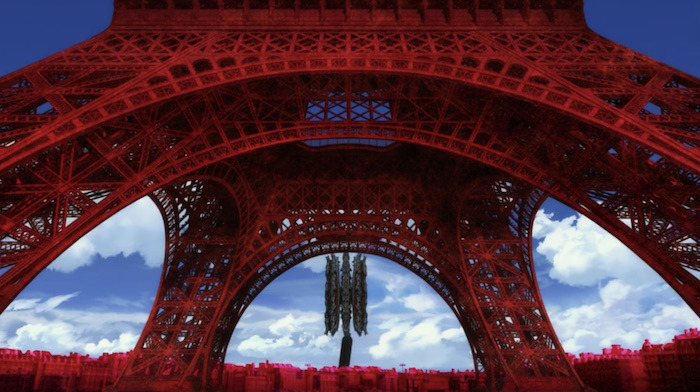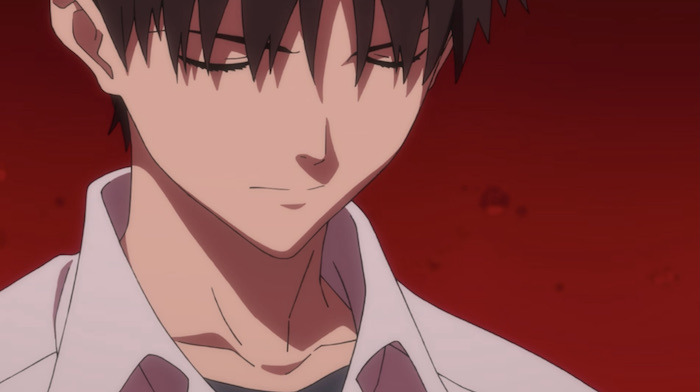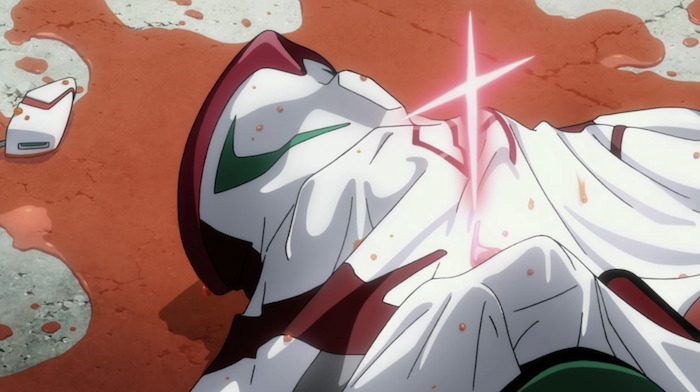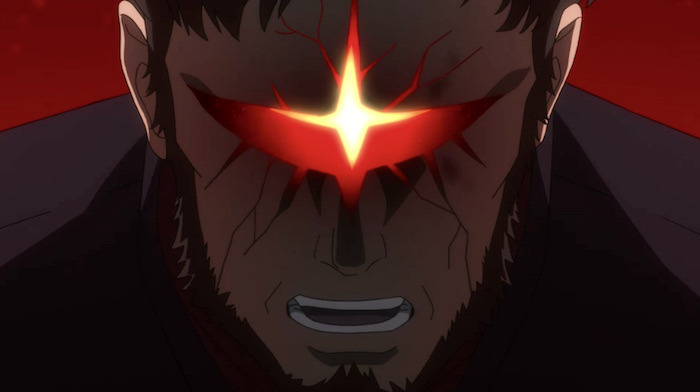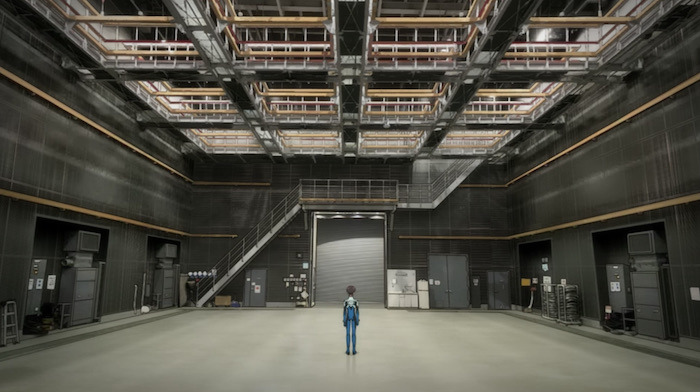'Evangelion: 3.0+1.0 Thrice Upon A Time' Spoiler Review: An Ending 25 Years In The Making
Neon Genesis Evangelion, the groundbreaking, apocalyptic mecha anime series, aired its final two episodes, 25 and 26, on Japanese television in March 1996. However, like protagonist Shinji Ikari (Megumi Ogata), listening to tracks 25 and 26 of his digital audio tape over and over, creator Hideaki Anno has found himself returning to the ending he first delivered in those two episodes, again and again.
A quarter-century later, in March 2021, Anno delivered his third ending to the Evangelion saga in Japanese theaters with Evangelion: 3.0+1.0: Thrice Upon a Time. It's the fourth and final installment in the Rebuild of Evangelion film series and it hit Amazon Prime Video worldwide on Friday.
The Evangelion movies are rather confusingly numbered and named and there have been so many different versions of them that a neophyte (or Neon-phyte) could be forgiven for not knowing where to begin or end with them. Two summers ago, we revisited Evangelion when the TV series and its two wrap-up movies, Evangelion: Death (True)2 and The End of Evangelion, arrived on Netflix — where they're still available to stream. What's on Amazon now is Studio Khara's re-translated, re-dubbed Rebuild tetralogy, consisting of Evangelion 1.11: You Are (Not) Alone, Evangelion 2:22: You Can (Not) Advance, Evangelion 3.33: You Can (Not) Redo, and Evangelion: 3.0+1.0 Thrice Upon a Time.
In the nine-year gap between the last two films, Anno co-directed one of the best Godzilla movies, Shin Godzilla. Like Thrice Upon a Time, it featured music by Shiro Sagisu, including some pieces remixed from Evangelion. Now, Anno is back to finish what he started with the Rebuild of Evangelion. Thrice Upon a Time serves as the culmination of everything that came before it in the Evangelion franchise and we'll be going full spoilers in our discussion of it.
You've been warned. Spoilers ahead for Evangelion: 3.0+1.0: Thrice Upon a Time.
Paris in Red, Mari in Pink
Thrice Upon a Time opens in Paris, the site of the next Summer Olympics (with another 20th-century anime classic, Akira, having anticipated this year's event in Tokyo and its empty National Stadium). It's not beach volleyball going on at the Eiffel Tower, though; color-wise, La dame de fer does look more like Tokyo Tower, the Japanese landmark it inspired. Instead of circling the wagons, the anti-NERV organization, WILLE, circles its flying battleships over the city, which "corization" — or core-ization from Angels — has left blanketed in red.
The Rebuild of Evangelion series established this visual early on, with one character likening the crimson aftermath of an Angel's destruction in Tokyo-3 to "the lakes of blood in the ancient depictions of hell." Seeing it again so soon after Godzilla Singular Point, however, only cements how indebted that series and its red tide were to Evangelion.
Mari Illustrious Makinami, voiced by Maaya Sakamoto, started out as a seemingly superfluous new character in the Rebuild of Evangelion. Anno inserted her as a wild card to help the narrative break free of its previous flow, but she seemed disconnected from the main story and never quite justified herself. Some fans resented this bespectacled babe who came parachuting in from out of nowhere with her Nikki and Paolo energy.
In Thrice Upon a Time, hers is the first voice we hear, singing. By the end, she will have taken on even greater importance, supplanting all the other women in Shinji's life — Misato (Kotono Mitsuishi), Asuka (Yuko Miyamura), and Rei (Megumi Hayashibara), and all the baggage they carry — with her happy-go-lucky personality.
For now, we see Mari piloting her pink Unit 08, jerry-rigged with a new set of arms, which she uses to fight a flock of Angel-like Evas over Paris. She rams the Eiffel Tower down the boss's throat and this is your opening action scene, the storm before the calm.
Stunted Emotional Growth, Made Physical
When Thrice Upon a Time catches up with Shinji, Asuka, and Rei, they're still walking through a red wasteland like they were back in 2013 when we last saw them. You Can (Not) Redo hit Japanese theaters in late 2012, but it wasn't until mid-2013 when the first version with English subtitles screened abroad.
The Rebuild of Evangelion started out as a remake of the TV series, with product placement of Doritos and Japanese brands like UCC Coffee, Yebisu beer, and Lawson convenience stores being the biggest noticeable difference. That's what made it so surprising when the second film concluded with the Third Impact. The end of the world was already happening in the middle of this new movie series.
You Can (Not) Redo made a 14-year time jump and put us in uncharted territory. One new wrinkle, or rather, un-wrinkle, that Thrice Upon a Time introduces is the idea that Eva pilots don't age. This is a way for Anno to literalize the metaphor of Eva pilots as otaku.
We've seen Shinji depressed and lonely. We've witnessed how socially maladjusted he was and how he only seemed to come alive within the womb of the Eva, with its umbilical cord cable and LCL amniotic fluid. No longer just a stand-in for the fanboy who self-medicates on arts and entertainment, he's become an actual man-boy in-universe.
He's stuck in a teen's body, as are Asuka and Rei. Their arrested development is now a physical part of them as characters. It turns out both gals, not just Rei, are clones as well ... but we're getting ahead of ourselves.
Shinji awakens in a quiet, idyllic village where his old schoolmates, Toji, Kensuke, and Hikari, are all now grown adults. Toji, the one-time bully, and Hikari, the freckle-faced class rep, are married and have a baby named Tsubame. Some viewers might get bored as Thrice Upon a Time enters a long stretch of downtime here, but to me, this section in the village is the most affecting and, indeed, poignant part of the film.
The Case of the Exploding Head
Shinji's world-saving (and world-ending) adventures as an Eva pilot are foreign to Toji, who says, "I kinda heard what happened to you, but it was too confusing for me." It's a reality check for him and us: the equivalent of a fanboy or fangirl meeting a friend or family member who cares nothing for their pop culture obsessions, these elaborate fictional mythologies that consume so much of their focus.
Maybe that's just me, the childless millennial who writes about movies for a living, reading into it with my own interpretation. But consider the context. Like George Lucas, Anno is a creative genius who has spent much of his adult life at the center of a media empire, which inspires childlike wonder in fans around the world but also maybe infantilizes some of them.
The title of Thrice Upon a Time alludes to this in how it casts the story as a modern fairytale à la Star Wars. In this case, however, it's a fairytale whose teller wants it to be a wake-up call, not another escapist refuge. By the end, Anno makes it clear that his aim is to confront the obsessive fan with the live-action reality that might lie beyond their own sheltered anime existence.
Rei's never seen a baby or a cat. She doesn't know the meaning of simple greetings like good morning or good night. Like many real-life celebrities, she doesn't know what a bath is, either. These are basic things that every human should know, but lest we forget, this "Rei" isn't even the real Rei. She's a copy of a copy of Shinji's mother, programmed to have feelings for him. Her thoughts are not her own; they're like thirdhand opinions absorbed through the water cooler or the Dummy Plug Plant.
The village gives Rei a chance at life. She goes to work in the rice paddies, and though she's still something of an alien presence with her blue hair and pilot's plugsuit, we get the sense that she has found contentment and could be happy here. That's what makes her death so absolutely brutal.
"I like this place," she says. "I wanted to harvest the rice. I wanted to hold Tsubame more. I wanted to be with the boy I liked, forever."
Then, her head explodes. That's the old End of Evangelion spirit, which isn't entirely gone from Thrice Upon a Time.
A Narrative in Freefall
Once more into the fray, goes Shinji Ikari. We've seen him do this on-again, off-again dance as an Eva pilot for 25 years, but this time, when he boards the assault ark, Wunder, to Antarctica after Rei's death, something's changed in him. His father, Gendo (Fumihiko Tachiki), is also greatly changed: he's now achieved godhood. Under his glasses, he looks like the X-Man Cyclops, with a single cavity of red light glowing where his eyes should be.
Speaking of things hidden behind eye covers, Asuka lifts her eyepatch and pulls an Angel out of her eye, transforming her Eva, and in the process, meeting the naked "original" version of herself, who alludes to her nature as a "Shikinami type" clone. Toward the end, we'll see her and dozens more clones like her floating in orange LCL tanks in the manner of Rei.
After the beautiful simplicity of the village, witnessing plot developments like this amid the action-heavy back half of Thrice Upon a Time left me feeling somewhat worn down as a viewer. Part of it was because I had marathoned all four Rebuild movies in one day: rewatching the first three as a refresher before this extra-long, 155-minute final entry. Yet part of it, also, was just because of how dense the mythology is, right up until the end.
The frame is cluttered, too: there are moments where a person might be hard-pressed to describe what is even happening onscreen. In its third act, Thrice Upon a Time goes into freefall, literally, with winged biomechanical ships and giant humanoid mechas skydiving toward a vortex to the Anti-Universe. Or something ...
This feeling of bewilderment and weariness in the face of a complex narrative maybe dovetails with some of Anno's artistic intent. He uses some very fake effects, what looks like 3DCG, to bring to life the floating white head of the so-called "Evangelion Imaginary." It seems possible this was an intentional choice to highlight the artificiality of this make-believe thing. By the end, we're visually relieved to see the animation break down into hand-drawn sketches as the real world comes creeping back in.
Running Out Into the Real World
Having Shinji wish for a world without Evas makes sense in the way that having Tony Stark destroy all his Iron Man suits at the end of Iron Man 3 did. It's Anno saying he's done with Evangelion the way Robert Downey, Jr. was done making solo Iron Man movies.
In the end, Shinji finally grows up and matures to the point where he can stop fighting his father and just talk to him, helping him and other characters like Asuka and Kaworu (Akira Ishida) work through their issues so they can move on and then he can, too. It's an inversion of what we saw happen in the TV series, which ended with a circle of friends clapping for Shinji, saying, "Congratulations!" after they life-coached him into accepting himself aloud.
There's a lot of talk of hope and despair and how they're "synchronized and attuned to each other." We revisit the End of Evangelion beach with Shinji and Asuka along with numerous other scenes from the franchise's history, before Shinji shutters the garage door and looks back on the empty studio space where Anno and his crew filmed Thrice Upon a Time.
"A happiness without Eva. That's what I wished for you," says his mother/Rei. Shinji soon winds up back on the beach, but this time, the water is blue like the sky, not red, and Mari is there.
This transitions into a train station, where characters like Kaworu and Rei mill about in plainclothes and an older version of Shinji sits with a briefcase. Anno sends him and Mari running out into the real world with a closing credits song that speaks of a boy caught up in a world of "comic books and daydreams." The song tells us, "He doesn't like who he is." He doesn't know what he wants. He just wants.
This is not that Shinji anymore. The kid who sought to fill a hole in his heart with Eva piloting has found a separate peace. All in all, Thrice Upon a Time delivers a happier ending than The End of Evangelion. That's my favorite anime movie, so this one had a high bar to clear, but if nothing else, it allows Anno to re-articulate what he wanted to express in a more uplifting fashion.

